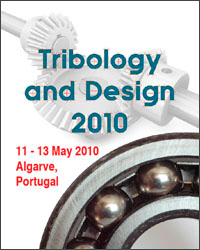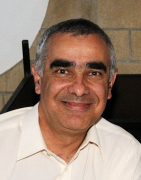Third International Conference on Tribology and Design
11 - 13 May 2010
Algarve, Portugal
Overview
 The third International Conference on Tribology has recently been held in the Algarve, Portugal, organised by the University of Porto, represented by Professor Jorge Seabra, the University of Bournemouth, represented by Professor Mark Hadfield and the Wessex Institute of Technology (WIT), whose Director, Professor Carlos Brebbia, opened the meeting.
The third International Conference on Tribology has recently been held in the Algarve, Portugal, organised by the University of Porto, represented by Professor Jorge Seabra, the University of Bournemouth, represented by Professor Mark Hadfield and the Wessex Institute of Technology (WIT), whose Director, Professor Carlos Brebbia, opened the meeting.
The first two meetings took place at Bournemouth University in the UK and concentrated on Tribology related to global environmental issues, where the remit of the conference was to consider wider application of Tribology within the context of the Engineering design.
Professor Brebbia thanked the delegates for attending the meeting, particularly those coming from distant regions of the world, some of whom may have experienced some problems in reaching the Algarve. He then explained the importance of conferences such as this within the WIT programme for dissemination of scientific results. The Institute – Professor Brebbia said – provides a mechanism for the transfer of knowledge amongst different parties, aiming to enhance interdisciplinary activities, ranging from engineering and physical sciences to social sciences, economics and other areas of research. The aim is to look at integrated solutions to the many problems facing the world today.
One of the main functions of WIT is the dissemination of advanced research which is done through the publication of books, Journals and other methods, most of which are now in digital format. WITPress, the academic publishers, are continually distributing digital versions of books and Journals all over the world.
Professor Brebbia also referred to the many links of the Institute with other institutions all over the world, which includes participation in joint international research projects, joint publication and the establishment of special honours and awards. The most prominent of these is the Prigogine Medal, set up by the University of Siena and the Wessex Institute of Technology. The award given annually to an outstanding scientist working in the field of ecological systems is to honour Professor Ilya Prigogine, Nobel Prize winner for Chemistry who was an Honorary President of a major WIT conference and was to be editor of the International Journal of Design and Nature, before his untimely death. The latest award was given in La Coruna, Spain, to Professor Felix Müller of the University of Kiel in Germany, who has developed original theories of ecological modelling.
Professor Brebbia finished his opening remarks by expressing his appreciation to his two Co-chairmen, who have collaborated very closely with the Conference Division of WIT and in the preparation of the conference book.
Professor Jorge Seabra welcomed the delegates to Portugal and in particular to the unique region, the Algarve, which has its own traditions, history, culture and folklore. The Algarve is famous for the excellence of its fish cuisine and the friendliness of the inhabitants.
The technical sessions were opened by a special address from Mark Hadfield, who spoke about advances in Tribology. He explained the importance of surface defects including those due to fatigue, delamination and other topics of great current interest to industry.
Professor Hadfield referred to the importance of tribology and its area of concern. Professor Hadfield said that our understanding of tribology needs to enhance all aspects including space applications, reliability, energy applications, advanced materials and corrosion. The conference gives academics and professionals the opportunity to share current ideas concerning Tribology within a wider context.
Invited Presentations
The first invited presentation was entitled ‘Gear micropitting: model and validation’ by J.A. Brandao of the Mechanical Engineering Department of the University of Porto. It presented a numerical model for the prediction of surface damage on gear teeth, comparing micropitting and wear. The model was applied to the prediction of micropitting and mass loss of gear teeth in an actual test.
Another invited presentation was entitled ‘A new identification method of the supply hole discharge coefficient of gas bearings’ by F Colombo and A Trivella, from the Politecnico di Torino, Italy. It described a new method to identify the orifice discharge coefficient of pneumatic externally pressurised bearings. Different tests were carried out with various air clearances and supply pressures.
Keynote address by Professor Jorge Seabra
 Professor Jorge Seabra, from the University of Porto gave a keynote address on ‘Ball Bearings Performance: Friction torque vs. grease rheological behavior’.
Professor Jorge Seabra, from the University of Porto gave a keynote address on ‘Ball Bearings Performance: Friction torque vs. grease rheological behavior’.
Friction torque – Professor Seabra said – produced by mechanical transmission has been attracting considerable attention, since the reduction of energy consumption and the increase of efficiency are mandatory. At the same time, environmental awareness has increased the use of biodegradable products.
The friction torque of a thrust ball bearing was measured for six different types of greases, including three biodegradable ones having low-toxicity additives. During these tests the bearing's internal torque, the internal temperature and the room temperature were measured and registered. Rheological evaluation of the lubricating greases were made using cone-plate geometry in sweep and flow tests, in order to measure the complex modules as well as the consistency flow indexes.
In order to compare the performance of the lubricant greases in terms of friction, the grease characteristics were related to experimental results obtained, showing that the interaction between thickness and base oil have strong influence in the bearing friction torque.
Conference Sessions
The conference papers were grouped together in the following sections;
- Design tools
- Test methods
- Surface engineering
- Tribology under extreme conditions
- Surface measurements and lubrication
The papers were followed by periods of discussions, during which many useful comments and suggestions were made. Participants were able to interact in many informal ways throughout the coffee and lunch breaks, as well as during the conference dinner and a specially arranged excursion. This resulted in a very friendly atmosphere. This helped to create new contacts and cement existing relationships, which is one of the most important aspects of conferences organised by WIT.
Conference Dinner
The conference dinner took place in a restaurant renowned for its local cuisine. The dinner consisted of fish and seafood dishes, as the Algarve is well known as a fishing region. The wines from the Alentejo region were of excellent quality. At the end of the dinner Professor Brebbia thanked the delegates for being participants in the banquet and gave them a souvenir to remind them of the happy occasion. This consisted of a piece of local pottery for which the local region is also famous. This pottery, which was hand painted with a picture of a fish, was most appropriate to the occasion!
Excursion
 An excursion was arranged during the second day of the conference, where the delegates departed during the afternoon towards ‘The End of the World’. This is the windblown Cape Saint Vincent on the western end of the Algarve – which lies at the extreme south-west of Europe. From there they visited Sagres where the views out over the Cape and the open Atlantic are magnificent. They visited the old village and fishing harbour.
An excursion was arranged during the second day of the conference, where the delegates departed during the afternoon towards ‘The End of the World’. This is the windblown Cape Saint Vincent on the western end of the Algarve – which lies at the extreme south-west of Europe. From there they visited Sagres where the views out over the Cape and the open Atlantic are magnificent. They visited the old village and fishing harbour.
Afterwards they saw Porta da Piedade, a collection of rock formations and from where there are fine views of the bay. They continued to the fascinating and historical town of Lagos, linked to the Portuguese Discoveries and the period of the navigators, who built  the Eastern Empire. Reminders of the past could be seen around every corner, including the site of Europe’s first slave market and the ornately gilded Chapel of Santo Antonio, with its adjoining museum.
the Eastern Empire. Reminders of the past could be seen around every corner, including the site of Europe’s first slave market and the ornately gilded Chapel of Santo Antonio, with its adjoining museum.
The group stopped for a barbeque dinner with music and dance at the Tivoli Lagos before returning to the conference hotel.
The conference was very successful in terms of quality of the presentations and the high-level of interaction between the participants. It will be reconvened at a date and location still to be decided.
Publication of Papers
The proceedings of Tribology and Design, 304pp (Print ISBN: 978-1-84564-440-6; Online ISSN: 1743-3533) are available from WIT Press priced at £115/US$230/€161. Orders can be placed online at www.witpress.com or by email:
Papers from the conference will also be hosted online in the WIT eLibrary as Volume 66 of WIT Transactions on Engineering Sciences (ISSN: 1743-3533). For more details visit the WIT eLibrary at http://library.witpress.com


 Wessex Institute
Wessex Institute